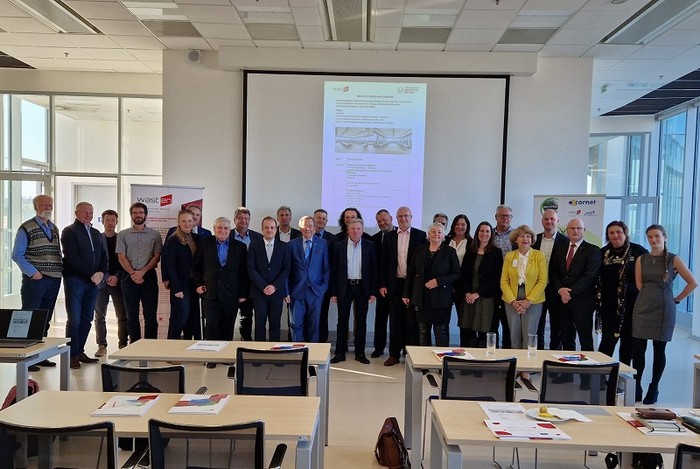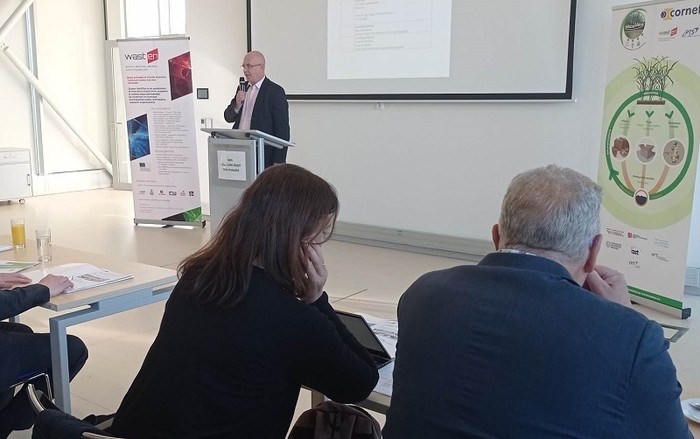The road to a circular economy doesn’t have to be thorny
On May 3 and 4, a workshop entitled WAYS TO CIRCULAR ECONOMY was held at the Czech Institute of Informatics, Robotics and Cybernetics, CTU in Prague. The event was a loose continuation of the workshop held last autumn in Dresden.

As in the first case, the Wasten Cluster and the Faculty of Engineering Sciences of TU Dresden took on the organisation and organisation. The theme of the workshop was a continuation of the previous one, which was entitled “Recovery of Valuable Materials”.
“The circular economy is becoming a useful concept for sustainable development. However, due to its complexity, it must also be addressed at an international level through cross-border cooperation,” pointed out Vojtěch Brož from the Wasten cluster and continued: “The aim of the event was to deepen cross-border cooperation between Czech and Saxon businesses, universities and research organisations in the field of the circular economy.”
The circle should turn slowly and be closed
The work shop was divided into two parts: the Presentation Block and the Round Tables. These were divided into sections on Metals/Electrical Scrap; Plastics and Tyres; Energy from Waste/Bio-waste; and Hydrogen.
The event was attended by a total of 40 visitors on both days and was mainly attended by experts in the field of circular economy from Saxony and the Czech Republic. The event was sponsored by the Saxony State Ministry for Regional Development and the Ministry of the Environment of the Czech Republic.
The worshop was opened with short presentations by Radek Hořeňovský, Secretary General of the WASTen Cluster and Prof. Dr.-Ing. habil. Christina Dornack, Vice-Dean for International Relations of TU Dresden. After a short greeting, she provided the participants with information on the effects of the circular economy on resource conservation. She stressed that the circulating material in the circular economy should turn slowly and the circle must be closed. Prof. Ing. Vladimír Kočí, Ph.D., MBA then presented to the plenary the importance of environmental parameters in the non-financial reporting of waste and recycling companies.
It is also worth mentioning a short lecture by the former Minister of the Environment of the Czech Republic and current Chairman of the Czech Business Council for Sustainable Development, Ing. Petr Jan Kalas.

In the next lectures, Milan Pátek, the Saxon State Ministry for Regional Development, described the transformation of coal regions through innovation, from the mouth of Prof. Dr. Ing. Niels Modler gave the audience a glimpse of polymer engineering and the role of the circular economy in the decarbonisation of industry was presented by Benjamin Hague, head of the think tank from the Circular Economy Institute.
Viktor Kuna from ENRESS, s.r.o. came to inform the attendees about thermal depolymerisation with a very interesting presentation. This technology is often described as revolutionary and is rightly attributed a major role in the field of circular economy.
Round tables
The subsequent roundtables, as already written, were divided into four sections. One leader was appointed at each table to record and evaluate the discussions. After the round tables, the designated persons were invited to present the conclusions at each table.
The table whose central theme was plastics and tyres recorded a lively discussion. Experts focused on addressing the specific challenges and opportunities that plastics and tyres present in the circular economy. They discussed how to promote the development and use of new technologies that enable resource efficiency and minimise environmental impact. They also looked at how to ensure that the results of research and development are accessible to industry and citizens. The main topic was the conversion of these wastes into secondary raw materials and the technologies needed for this conversion.
The Energy from Waste/Bio-waste table was of greatest interest to visitors.
Discussants at the Energy/BioWaste table discussed the sub-topics of recycling and separation of bio-waste, biogas and biofuels, energy efficiency and research and innovation. Important contacts were established, especially between universities from the Czech Republic and Germany, and the possibility of joint cross-border projects in the fields of bio-waste processing and energy crop utilisation was raised.
Hydrogen
Due to lower interest in the topic Metals/Electrical Scrap, this roundtable was merged with the topic Hydrogen. The discussion on hydrogen covered both specific pilot projects, such as the Hrabůvka heap in Ostrava; Green Wilhelmshaven etc., but also the general role of hydrogen in the circular economy. The production, transport and storage of hydrogen, which unfortunately are still very expensive at present, were discussed.
Participants also discussed the categorization of hydrogen according to its origin or how it is produced. Discussants concluded that hydrogen can play an important role in the circular economy, but its use will depend on many factors such as the cost of production and storage, the type of hydrogen, and the availability of technology and infrastructure for its use.
The future
The whole event showed that bringing together experts from different countries is crucial for developments, new projects and cooperation in the circular economy. The event generated concrete ideas for new projects and solutions that have a great chance to be implemented in the future through cross-border cooperation.
“In the future we would like to follow up the WAYS TO CIRCULAR ECONOMY workshop with further events. The plan is to continue these events twice a year, alternating between Saxony and the Czech Republic. The topic of future events will always be the circular economy, but the focus of the roundtables will always reflect the interest of the participants from both countries and the current issues of the circular economy,” added Vojtěch Brož.

